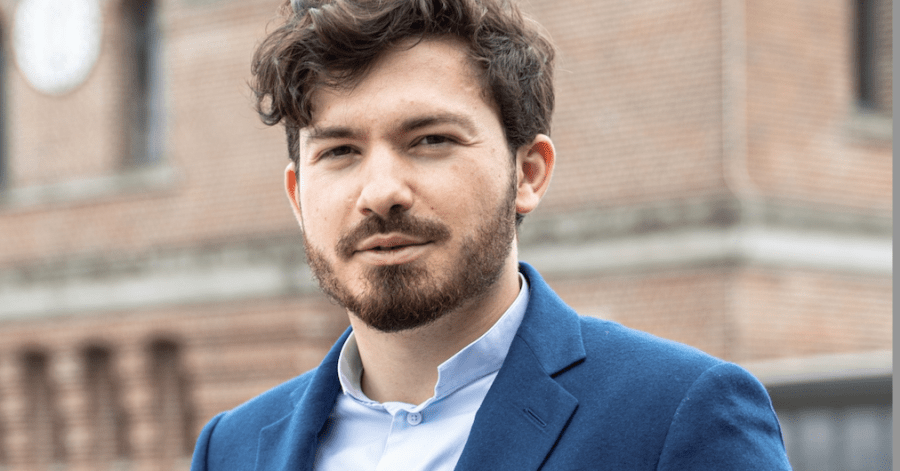Western investors are increasingly turning an eye towards Eastern Europe, drawn by the abundance of tech talent and entrepreneurial mindset available in the region. Most recently, EuraTechnologies, a French incubator and accelerator, has raised $24M in funding to establish university incubators around Eastern Europe. The Bulgarian Startup Association, BESCO welcomed Nicolas Brien, chairman of the board of EuraTechnologies, who came to Bulgaria last month to establish connections with Bulgarian tech institutions. Nicolas started out as a political advisor but later became fascinated with startups and developed a career that contributes to the global conversation on tech policies.
The Recursive met with Nicolas to discuss the need of bridging the gap between university students and the job market, and what role can universities play in recognizing and cultivating the entrepreneurial mindset.
Read more about investors’ aspirations for sustainable deep tech made in Europe and how this will rely heavily on hardware products in addition to software. Brien goes on to further explore:
• What is the secret sauce for successful startup teams;
• Why the future of digital transformation is in industrial startups;
• Why we won’t solve climate change with software.
The Recursive: Hello, Nicolas, welcome back to Sofia. It’s not your first time here, right?
Nicolas Brien, chairman of the board of EuraTechnologies: Every time I come here, I’m really fascinated by the tech expertise of Bulgarians. And what is also fascinating is there is no real ambition to turn this expertise into startups. I see a lot of people going to work for IT companies and large corporations, but I don’t see many people turning this great expertise into great startups. We have a missing link here.
What do you think is this missing link?
There are many dots that are missing to make this link. The very first one is that universities should see their mission as providing jobs to students. And there are three ways to create jobs for the students. The first one is to make sure that large corporations hire them. The second one is to make sure that they get into research and public service. And the last one is to make sure that they create their own job by creating their own company. And I feel like universities have been doing a great job focusing on the very first two. We have huge amounts of graduates that big companies, especially in the US, hire and we have great students that go into public service and research. But we actually are failing to fulfill the aspirations of students who are willing to create their own companies. What would be very interesting is to see each faculty having their own sort of startup incubator, to help students, alumni, and professors to create spin-off companies and tech startups out of the great expertise that is in the academic world.
How to promote entrepreneurial mindset in universities? What do you think are the most important factors for that?
The key is interdisciplinarity. The startup teams that are very successful on the continent tend to have this secret sauce, which is having diverse people working on a project. You will seldom see successful startups that are made of two engineers or two marketing guys. You need someone with a strong tech background to meet someone with a strong business background in order to make things happen. So, I would turn around your question. I wouldn’t say how we foster the entrepreneurial mindset. It will be about how to reconnect people with an entrepreneurial mindset with people who have a strong tech background. And this is the purpose and the role of startup incubators, especially the ones that are located in universities.
This is also a part of the mandate of EuraTechnologies now, correct? You recently raised an investment of €24M. Can you walk us through your concept and your mission?
We have a strong European mindset. We do believe that great successes are going to come from projects and startups that have a continental ambition. We don’t really think that there is such a thing as big market for startups, we only think that there is a continental market for startups. And today what we see in some countries in Europe is that startups are still very focused on their domestic or regional market, instead of really thinking from day one at a continental level. Some people in the US say that you have to be global from day one. We think this is not right and we think that we should be continental from day one.
At EuraTechnlogies we have seen many startups, producing great software, and great platforms. I do believe that we are entering the second phase in the digital transformation of the world. It is not only “Software is eating the world”, but “Hardware powered by software is going to eat the world”. And we’ve seen during the economic crisis that many industries and sectors which were thought to be protected against digital transformation are not: healthcare, retail, e-commerce, proptech, and agriculture. And all of a sudden, you realize that, well, there are waves of digital transformation that are going to unroll in these industries. And these industries won’t be fully transformed with nice software. We need hardware, we’re talking Industry 4.0. We are in a new phase of digital transformation, where startups are not three cool kids with a hoodie in a garage. Instead, they are the startups that are going to be building factories. I do believe that the future of digital transformation is industrial startups.
The largest factories being built at the moment, in France, are being built by startups, not by legacy players. And that is pretty much the point why I’m here today. I’m looking at tech ecosystems with a strong industrial background, with people who want to turn critical expertise into startups. So far, there are many ecosystems in Eastern Europe where this connection between deep tech and startup is not totally satisfactory.
Can you be a bit more specific in which verticals do you see the biggest potential when it comes to Eastern Europe?
The challenge of this century is climate change. And sometimes I’m desperate when I hear all the great talks at Davos. When you hear these tech people, you feel like they truly believe that we’re going to avoid climate change with software. I do believe that at some point we will solve climate change with hardware, but we will have to rethink the cities, rebuild a lot of construction projects, and think about transportation. This is not going to be changed with software. We will need to build substitutes for which a lot of industrial expertise will be required. And there’s a reason why deep tech is so important. Deep tech is not only about software, deep tech is also about hardware. The most promising thing in the field of GreenTech and Cleantech is the amazing industrial expertise that has been built in Eastern Europe. But now the challenge of decarbonizing the industry is massive.
What about the old industry? Because it’s the old industry that is creating most of the CO2 emissions, right? Why do you put so much hope in startups?
These industries obviously have to cut some of their emissions. But they will also have to find new innovative ways of doing their business. For example, during the last years, we have seen fewer and fewer university applications from electrical engineering students, because it was so trendy to go into computer science and software.
But tell me how do you solve the energy crisis with software? You need, at some point, some electrical engineering students. And you need these electrical engineering students to create startups. To give you a second example, the company that is reducing the most carbon in the atmosphere on the European continent is a steel company. They invested hundreds of millions of euros per year into startups to decarbonize their production, in order to rethink their buildings, in order to totally revamp their logistics and supply chains. This is a gigantic opportunity for green tech and fintech startups to make sure that you have a very concrete and positive change in the industry.
EuraTechnologies is already one of the biggest incubators in Europe or if not the biggest. With the new investment, you’re going into a next phase of establishing branches in Eastern Europe. What is the value proposition for startups?
I want to help them save time and money. That’s the key value proposition of EuraTechologies. What is extremely important is to look at the ecosystems in the world that have produced some of the most impressive tech companies. It’s Estonia and Israel. I do believe that what Bulgaria needs is a bigger market for startups to scale. It’s the total opposite of brain drain. We add your AI technologies, we want Bulgarian founders to create their startups locally to have the headquarters in Plovdiv or Sofia, or wherever, to keep the IT and the IP in their home country. But our value proposition is to open up the bigger Western European market and to make sure that these companies actually scale at the continental level and do not stay at the domestic or regional level.
How is the value proposition connected to the EuraTech Venture fund?
What we see in Bulgaria is a funding gap. The average seed round in Bulgaria is 10 times smaller than the average seed round in Germany. And this is a great challenge to the Bulgarian ecosystem. Many people are going to have the same idea at the same time. If a German founder is able to raise 10 times more money on the exact same ideas as a Bulgarian founder, guess who’s going to win? So I think we shouldn’t underestimate funding because I’ve never seen a company in my life, hiring people with zero money in their bank accounts. Money is where we get the fuel into the rocket ship.
What is the purpose of your visit? Is EuraTechnologies looking for potential partnerships with the universities?
Universities are the talent pools of the future. And as an early-stage startup incubator, I’m here to sign agreements with the presidents of the universities in order to have this win-win partnership, where we offer a free incubation program for anyone who can make it because we’re very selective. And in exchange for the best talents that they have, we make sure that the technology and expertise do translate into a startup idea instead of being stocked on some bookshelf. When a great professor produces a great research paper, he gets invited to many international scientific congresses. But if this idea is not translated into a startup project by his or her students, it won’t make an impact. That’s pretty much what we want to do. We want to accelerate the use of ideas developed by the universities into startup projects.
What is very important is that Eastern Europe has great talents. Western Europe has great investors. Eastern Europe has amazing drive, amazing ITs, and amazing tech expertise, and in Western Europe, there are bigger markets. So we need to find this Win-Win relationship.
Which universities are you currently looking at?
In Sofia, there are two. We consider Plovdiv because we liked the industrial background of the city. I’ll be in Romania in October and we are considering Cluj. Our ideal ecosystem is a tech ecosystem where there are a lot of technological universities and a strong industrial culture and a big pool of students. So we are also looking at Zagreb, Croatia. Many more to come. And Poland also, we were looking at Wroclaw. They’re calling it the Silicon Valley of Poland. So it’s a very industrial region. Lots of tech talents and one out of seven inhabitants is a student.
What are you looking at when it comes to startups? At what stage should they be? What is your investment thesis?
At EuraTechnologies, we’re looking at early-stage startups. And we like to catch them between the idea stage and before go-to-market. So, if they are still prototyping, that’s interesting to us. If they’re still creating their MVP, that’s interesting for us. Obviously, we are open to startups that already have clients and traction, but we focus on the early stage because this is where we can bring value.
The two main sets of criteria that we have are: first is what we call meaningful tech and then will the project have clients. By meaningful tech, I mean solutions that have a real and meaningful impact. We have climate change to solve, we have huge challenges when it comes to social inclusion. We cannot afford to waste time on cheap and fancy ideas.
Some of our shareholders are public shareholders, so they don’t care about the dividends, and the profits, they care about the social and environmental impact of the projects. What is very important to us is that the startups are addressing real meaningful social and economic challenges. As you said we don’t take the next Instagram filter. The share of public shares to private is 55% to 45%.
The second criterion is about measuring which companies have the best chance to reach a product market fit and become profitable.
Speaking of criteria, what about female founders? Is it also something that your shareholders care about?
My board is chaired by a woman. So she does more than care. Let me add that I didn’t start my career as an entrepreneur. I started my career as an advisor to the French government. And the very first minister that I advised was the Minister for Women’s rights. So I’ve had, I would say, long-standing and consistent views on the matter. When I took over at EuraTechnologies, we had only 8% female founders of the incubator. So we’ve had a very aggressive revamping of our strategy to make sure that we have in the current class 25% female founders, and all target for the end of 2023 is 40%.
There is an increasing amount of female tech graduates in Eastern Europe. We do believe that we just need to spark their will for entrepreneurial projects. And that’s the reason why we are willing to create incubation programs inside the universities in order to source our candidates or applicants very early on. And it’s not necessarily STEM students. It can be alumni, it can be faculty. We do believe that Bulgarian universities could produce a lot of very interesting spin-off companies.
Do you plan somehow to collaborate also with corporates, with the established industry?
We are looking forward to signing sponsorship deals with corporate innovators. It is not about the money that we could gain out of this corporate sponsorship deal. It is really about our mission. Around 85% of all startups are B2B. So our mission is to connect B2B startups with businesses. Legacy players have a huge need for solutions for their digital transformation.
Part of the magic is to be working closely with the corporate because also the corporates are the ones who have a customer base, and a lot of industry know-how, especially if it is a regulated kind of industry.
As part of the program, we are opening a vast network of mentors, local mentors, and international mentors. And hopefully, a vast network of corporates, can test the products, give feedback, and help the founders find the correct product market fit for B2B.
Is the call for application is already open? Can startups that are interested already apply now?
They can apply now for the French incubator. Around 25% of founders are international. It is not only French, Belgium, and Dutch founders, there are international founders. We have people from Ghana, Lithuania, and pretty much everywhere. So, a Bulgarian founder can totally apply to EuraTechnologies right now. He or she just needs to pay for the plane tickets and the housing expenses.
Some of the best projects that we had, were coming from Russia, before the war, and some of them were coming from Poland. They just incorporated the company in France and overnight they could send bills in euros, they had no problem with exchange rates, and they could access the market at 300M customers in euros. And they could get VC money also because no Western Europe VC is going to invest in BGN (levs) in Bulgaria. It is easier to open up an office in Amsterdam in order to get an investment in euros for the company.
I guess you are industry-agnostic, but do you see a specific focus especially here in Eastern Europe that you are going to have in your selection strategy?
We do not pretend that we are good at everything. So we try to be very good at a few things. Historically we have had a strong focus on fintech, on retail e-commerce, and now we are turning our focus and really concentrating on cyber security, proptech, agriculture, robotics, and Industry 4.0. I am talking about industries, not technologies. We are happy to welcome startups who use blockchain for agriculture and AI for cybersecurity
What is your business model? How do you make money?
It is a transitioning business model. So, startup incubators have been considered dead after COVID-19, because everyone thought that startups will never need an office again. What we have realized is we have never been so packed and profitable since COVID-19. Because a startup incubator is so much more than just an office space. We help people recruit their first teams, help people raise their first rounds, and we help people expand to their very first international markets. We connect them with mentors that are going to answer in 5 minutes questions that they have been asking themselves for the last 3 months. Before COVID-19, most startup incubators used to be some sort of real estate project. You make your money by renting office space to successful startups. So that’s pretty much what our business model is like. Now we are turning still renting office spaces, but we are turning increasingly into a success fee business model where we get rewarded every time that we create some form of success for the startup. So, if I help you recruit top international C-level, I get a success fee, if I help you raise funds, I get a success fee.
But you are not looking for equity in this case?
I am not looking for equity. We do have a startup studio, where we take equity, but for the mainstream incubation and acceleration program, we don’t take equity. I’ve always found it extremely unfair that when you get into an incubator, the minute you start breathing the air of the atmosphere, the incubator takes 70% of the startup. They leave nothing for you. I prefer to see our business model as being fair and we reward ourselves if you are successful. We reward ourselves if we actually do our job, not before.
In the end, I have one philosophical question. Societal or environmental challenge would you like to see solved by a startup that is coming from Eastern Europe?
The question of full sovereignty. We look at Poland, Bulgaria, and Ukraine, these are countries where agriculture has a very high standard of excellence. Very good products, very strong traditions. How are we going to feed these 9 billion people on the planet without cutting all the forests and without using so many chemicals and releasing carbon into the atmosphere? That’s one of the biggest challenges. I used to say that environmental transition is an agricultural transition. And we have been very much focused on decarbonization, but we haven’t been focusing much on agricultural transition. We think that this agricultural transition is the key- piece and is truly a missing piece of the environmental transition. And I see a lot of untapped potential in Eastern Europe. If I look at the great PhDs agro-alumni, none of them is creating stuff, that’s a shame because they would come up with great stuff.








